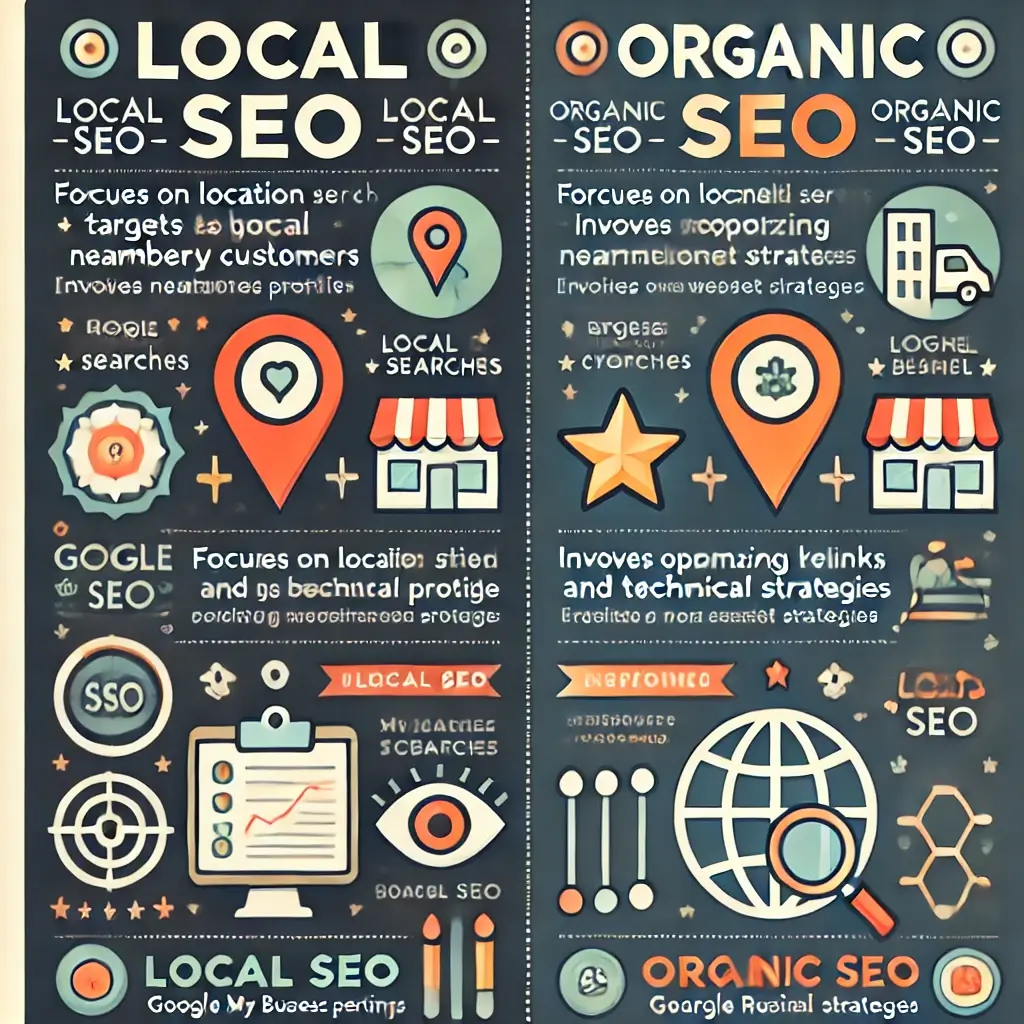
The difference between Local SEO and Organic SEO lies in their focus, strategies, and goals. Here’s a breakdown of the distinctions:
1. Target Audience:
- Local SEO: Targets users in a specific geographic location. It’s designed to improve visibility for searches with local intent (e.g., “coffee shop near me,” “plumber in New York”). The focus is on helping businesses appear in local search results, Google Maps, and location-based searches.
- Organic SEO: Targets a broader audience without location-specific limitations. The goal is to rank for general search queries on search engines globally or nationally, regardless of the user’s geographic location.
2. Search Queries:
- Local SEO: Optimizes for location-based keywords like “best dentist in [city]” or “pizza delivery near me.” It focuses on queries that involve local services, businesses, or products.
- Organic SEO: Optimizes for broader keywords that do not necessarily involve location. For instance, it would target keywords like “best fitness tips,” “how to start a blog,” or “best laptops 2024.”
3. Ranking Factors:
- Local SEO: Heavily influenced by Google My Business (GMB), local citations, reviews, proximity to the searcher, NAP (Name, Address, Phone) consistency, and localized content.
- Organic SEO: Influenced by factors such as content quality, backlinks, keyword optimization, on-page SEO, and website structure. It’s more about relevance and authority for specific keywords.
4. Search Results Appearance:
- Local SEO: Appears in Google’s Local Pack (a map and list of businesses) and Google Maps. Local searches will often display these results prominently.
- Organic SEO: Appears in the traditional organic listings on a search engine’s result pages (SERPs), typically below ads and local results.
5. Google My Business (GMB):
- Local SEO: Requires a well-optimized Google My Business profile. This is essential for improving rankings in local searches.
- Organic SEO: GMB is not typically a factor for organic SEO rankings unless you’re also optimizing for local searches.
6. Link Building:
- Local SEO: Focuses on acquiring local backlinks from businesses, directories, and organizations in the target region.
- Organic SEO: Focuses on getting high-authority backlinks from websites globally or nationally, without a geographic focus.
7. Mobile Optimization:
- Local SEO: A higher emphasis on mobile search optimization, as a majority of local searches come from mobile devices (due to proximity searches).
- Organic SEO: Also requires mobile optimization, but it’s not as focused on the “near me” aspect as Local SEO.
8. Content Focus:
- Local SEO: Uses location-specific content, like blog posts about community events or pages about services offered in a specific area.
- Organic SEO: Focuses on general content that appeals to a wider audience, with less emphasis on location.
9. Goal:
- Local SEO: The goal is to drive foot traffic to physical locations and increase visibility for searches with local intent.
- Organic SEO: The goal is to improve a website’s visibility for broader, non-location-based searches and drive website traffic.
Summary:
- Local SEO: Optimizes for visibility in a specific location, ideal for brick-and-mortar businesses or service providers.
- Organic SEO: Optimizes for general search engine rankings across broader, non-location-based queries.
Read More
5 Problems everyone has with Local SEO – How to Solve them?
Search Engine Optimization(SEO) – A Basic Over View
Optimizing organic traffic and UX through an iterative content process
Local Business Listing Sites List in USA
Pros and Cons of brands using social media for advertising




